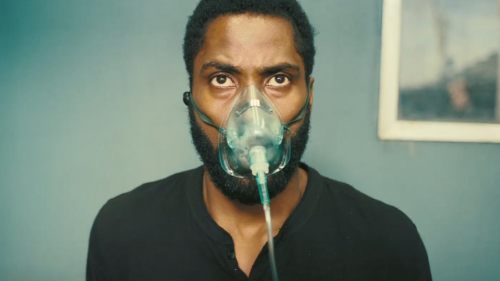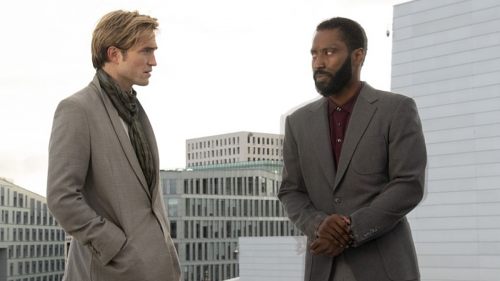On BATMAN BEGINS At 10
Batman screenwriter Sam Hamm said of the transformation from Bruce Wayne to Batman, "You totally destroy your credibility if you show the literal process by which Bruce Wayne becomes Batman." Fortunately, the next director to take a crack at Batman didn't pay attention to that statement. Instead of creating another straight-forward superhero flick, Christopher Nolan used Batman Beginsto attempt to define the man underneath the mask for the first time in his many depictions. Nolan had made a departure from other comic book movies, and he had done it by staying in touch with his indie roots.
When audiences saw the film in June of 2005, critics and fans alike wondered exactly where the hell that movie came from. With its depth and a feel for character development, Batman Begins was a far cry from the neon-tinted camp of Joel Schumacher's Batman films. The problem with Batman in Batman Foreverand Batman & Robinis that the character never saw any development as the series continued. He was just a fixture in the background of a series of origin stories for the villains he fought. Fortunately, for fans hoping for a Batman film to actually be about Batman, Christian Bale was able to actualize both the man and the masked crusader.
Known primarily for his impressive work in Memento and Insomnia, Christopher Nolan likely wasn't the first choice of fans when he was announced as the director of a Batman reboot, but fans are rarely the last word on any creative decision. Nolan took his psychological thrillers and applied them to the summer blockbuster world of Batman, concocting a blend of style and substance that was missing from the comic book film landscape. Christopher Nolan's Batman isn't a superhero, rather a vigilante with a flair for the dramatic. He does what he does not for the glory or press, but because only he can operate without obstruction of the law, unlike an FBI agent or police officer. Batman is without question one of the world's foremost superheroes, but beneath the cape and cowl is just another detective with severe anger issues. Most impressive is Nolan's choice to not reveal Batman, as we know him, at least, until the second half of the feature. Instead of combating an over-the-top gallery of rogues, this new trilogy is kicked off with Batman plagued by institutional corruption in the police department, mayor's office and the financial elite of Gotham. Bruce's parents possessed the hubris to attempt to take on the powers that be, and in keeping with the tragedy that colors the psyche of Batman, they were violently murdered for their efforts.
Audiences were intermittently reminded of the Wayne's murders, but until then, the power of their death was left unrealized because they barely registered any screen-time. Bruce's childhood factors in heavily in Begins, and because of it, the loss of his parents is more powerful. A man consumed by revenge and justice flailing around the night was a stark contrast to the figure constantly in control of himself that audiences were used to. Now being acknowledged was the constant conflict between Bruce Wayne, the man, and Batman, the symbol. There are consequences to dressing up as a bat and parading through the city enforcing your own sect of vigilante justice. Quickly the line between criminal and hero is muddled. The themes of duality/identity, left untouched by previous directors, were very much on display. Bruce Wayne is tortured about his need to save Gotham from itself, stopping just short of calling himself psychotic.
Undeniably, Batman Beginswas still a superhero film, despite the facelift Nolan delivered, but the foundation for a genre-breaker was laid down to be further explored in The Dark Knight. Batman Beginswas born out of an homage to Richard Donner's Superman, though Nolan had a different influence in mind for the sequel. In an interview with Empire, Nolan noted "the audience accepts that type of storytelling where you're looking at the police, the justice system, the vigilante, the poor people, the rich people, the criminals. I'm hoping it's the sort of film that Michael Mann always did very well, like Heat." The resemblance between both films isn't obvious, as one is focused on superheroes and the other is cops and robbers, but upon further inspection there are several nods layered throughout the movie. Mr. Nolan's enthusiasm for Heat is revealed almost immediately when The Dark Knight opens not with the titular hero, but with a bank heist perpetrated by Heath Ledger's Joker. Short of the masked reveal of Batman's most famous antagonist, it would seem like something out of Mann's own oeuvre.
While both heists are structurally similar, the real inspiration from Heat present in The Dark Knight is felt in the relationship between Batman and the Joker. In Lt. Vincent Hanna (Al Pacino) and Neil McCauley (Robert DeNiro), Heat examines the ways the cop and criminal need each other. Vincent and Neil get a high off of chasing and out-witting one another. The diner scene with both men reveals just how alike they both are. Each man has dedicated their lives to a pursuit, the only difference between both men is that they reside on opposite sides of the law. Batman and the Joker have their own diner moment during the Joker's interrogation at Gotham Central Precinct. One thing immediately becomes clear: The Dark Knight and the Clown Prince of Crime have the same, perverted cycle of dependency that Hanna and McCauley did. Neither man will give in, one will have to be stopped or put in the ground. They exist to hunt each other. Batman could end the Joker's mad reign by letting him die, but he chooses to honor his code, saving him at the last minute. A marked difference from 1989's Batman. The Joker's story ends in The Dark Knight, but the ramifications of the philosophical war he waged are felt in the next film.
The Dark Knight broke box-office records and swept up both critics and moviegoers alike in its long run in theatres, but what's truly impressive is that all of that success came with a film that never hesitated to break with convention. Some directors are afraid of introducing sophistication into four-quadrant blockbusters, but the paranoia and surveillance state of post-9/11 America is seeped into the Gotham of Nolan's trilogy. Audiences saw a world that looked a little closer to ours outside the theatre than the stylized metropolis from previous films. The Joker's intentions were those of a terrorist instead of a crazed prince of crime. Batman's sonar device was an invasion of privacy, but a measure that he insisted was necessary for the protection of citizens. Here, we have the biggest Batman film of all time and Nolan choose to end it with Batman viewed as a villain by those he devoted his life to saving.
Fans weren't sure if Nolan would come back to continue where The Dark Knightleft off—or if it even needed continuing—but Nolan found a fitting conclusion to Bruce Wayne's story with The Dark Knight Rises. Although the conclusion to the Batman trilogy suffers from the dreaded escalation of doom that marks most sequels, the importance of Bruce/Batman's evolution was not lost. Rises wasn't a cash grab, but the chance to complete the character arc that Nolan had started in 2005 with Batman Begins.
When we meet Bruce as the film begins he is quite different from where we last left him. Dejected by the shame of what has become of his city, Bruce uses the newly constructed Wayne Manor to make himself a recluse. Batman took the blame for the murders Harvey committed to preserve Dent's reputation as the savior Gotham needed to turn the corner, yet what came from Dent's legacy is not what Gordon or Bruce expected. Gotham, eight years after the events of The Dark Knight, is a borderline police-state. Blackgate prison is filled with those that Dent tried in court, but terrorists roam the streets of the city, and class warfare threatens to tear everything else apart. When a threat arises that he can't ignore, Bruce dons the Batsuit one more time.
Fortunately, for all of the heightened stakes that too often take up running time in big-budget sequels, Nolan and co. don't lose sight of Bruce's arc. In a move that mirrored Batman Begins, Nolan subverts expectations by taking Bruce out of the cape and cowl for a majority of the film. A bold choice for a sequel to one of the most profitable films of all-time, but one necessary to bucking the template of superhero trilogies that had been frequented so often. Previous trilogies involving Superman, Spider-man and the previous iterations of Batman weren't really connected in any way with the exception of the cast and a blueprint laid out by the studios. The number of villains increases, the destruction is hiked up to global calamity, and then the hero saves the day and gets ready for the next movie in two years. What Christopher Nolan gave audiences with the conclusion of The Dark Knight Rises and, with that, the end of the trilogy, is a self-contained series that doesn't necessarily give fans what they want, but exactly what they need.
Batman didn't place trust in the hands of others, but to overtake Bane, he relinquished his burden to Lucius Fox, Commissioner Gordon and Selina Kyle and, in doing so, managed to create the vision of Gotham that his parents envisioned long ago. For so long Batman was resigned to unchanging stasis that left the character without closure for almost a hundred years. By not rigidly adhering to what stories have come before, Rises offers something unique for moviegoers to witness: A Batman who could walk away when the job was finished.
Warner Bros. and DC may have allowed the director the privilege to theoretically end Bruce's reign as Batman because they knew they could reboot it all over again in three or four years, but Nolan's stand-alone universe will always be available to us. As we await a new Batman (played by Ben Affleck), let's stop and consider the efforts made to create a cohesive trilogy that wrapped up everything established by Batman Begins. The optimism of Bruce's young crime-fighting career was met with despair in The Dark Knight, but ultimately Bruce saw his faith in Gotham rewarded in The Dark Knight Rises.
Christopher Nolan took a different approach each time out and showed that creative risks could be taken with even the most corporate of films, establishing a trilogy that gave other filmmakers the nudge to do something different with these heroes. And it all began with a reboot ten years ago.



